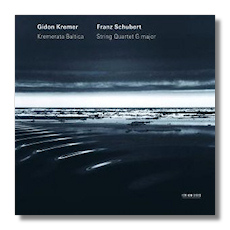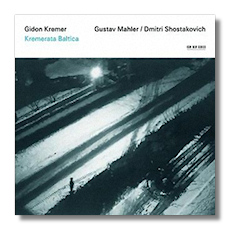
The Internet's Premier Classical Music Source
Related Links
-
Mahler Reviews
Schubert Reviews
Shostakovich Reviews - Latest Reviews
- More Reviews
-
By Composer
-
Collections
DVD & Blu-ray
Books
Concert Reviews
Articles/Interviews
Software
Audio
Search Amazon
Recommended Links
Site News
 CD Review
CD Review
Kremerata Baltica

Franz Schubert
- String Quartet in G, Op. posth 161, D.887 (orch. Victor Kissine)
Kremerata Baltica/Gidon Kremer
ECM New Series 1883 (4761939) DDD 55:02


- Dmitri Shostakovich: Symphony #14, Op. 135 *
- Gustav Mahler: Symphony #10: Adagio (arr. by Hans Stadlmair and Kremerata Baltica)
* Yulia Korpacheva, soprano
* Fëdor Kuznetsov, bass
Kremerata Baltica/Gidon Kremer
ECM New Series 2024 (4766177) DDD 76:33
There's a long tradition of taking string quartets and turning them into works for string orchestra. Schubert's quartets, with their symphonic breadth and depth, frequently have been treated in this manner, and so have Beethoven's and Shostakovich's, among others. (But can you imagine doing this to, say, Debussy's String Quartet?) One could simply take the original quartet parts and assign them to the corresponding orchestral sections, but that naïve approach doesn't necessarily work and could be, in fact, musically disastrous for many reasons.
Schubert's final string quartet, apart from its first movement, was not played in the composer's lifetime because of its perceived technical challenges for the performers, and its intellectual challenges for the listeners. In terms of its length and emotional intensity, there is nothing like it in Schubert's output. It bursts the string quartet genre wide open, and therefore seems to be a particularly strong candidate for arrangement for string orchestra.
This new arrangement has been created by Victor Kissine, a contemporary and friend of Gidon Kremer, who originally began to create it for Yuri Bashmet's ensemble, the Moscow Soloists. Kissine definitely did not take the naïve approach in this arrangement, in which (paradoxically) many details have been changed to bring the arrangement as close as possible to the spirit of the original. One analogy might be the makeup that actors must apply to their faces before appearing on stage: close up, it can look almost freakish, but from our seats in the auditorium, the effect is so natural that the actors seem not to be wearing makeup at all.
For some time, this arrangement was a "work in progress" for Kissine, Kremer, and Kremer's Kremerata Baltica, and part of its evolution is traced in ECM's booklet through a series of letters exchanged by Kissine and Kremer. The outcome, at least as it is presented on this CD, is utterly convincing and, well … Schubertian. Kissine's arrangement never feels like a cheapening or a coarsening of the original, which sometimes can be the case in projects like this. The quartet's terrors and tensions remain intact, and so does its frightening intimacy. In principle, I don't love the idea of turning string quartets into works for string orchestra, but if you're going to do it, this is how it should be done. Kremerata Baltica plays it with desperate passion, yet the music is not sensationalized. The recording was made in 2003, in the Pfarrkirche St. Nikolaus in Lockenhaus, and is admirably clean and atmospheric.
If a Schubert string quartet can be played by a string orchestra, why can't a Mahler symphony? That's a question answered by the second CD. Mahler's Tenth Symphony was left incomplete at the time of the composer's death in 1911, but Mahler did complete the extended Adagio movement, and sometimes it is programmed on its own. This arrangement for string orchestra dates from 1971, when Hans Stadlmair prepared it for his Munich Chamber Orchestra. The version recorded here is based on Stadlmair's, but with additions by Kremer and Kremerata Baltica. More than anything else Mahler ever wrote, this movement pushes at the edges of tonality – it is both a leave-taking and a new beginning – and hearing it played by strings alone does nothing to lessen its elegiac tone, its moments of terror, and its overall effectiveness. Bravo to Kremerata Baltica for this!
And no less of a bravo to them for the Shostakovich Fourteenth Symphony, an explicitly death-haunted work that complements Mahler's Adagio (and Schubert's Quartet!). A vocal symphony for soprano, bass, strings, and percussion, its 12 sections are settings of poetry by Lorca, Apollinaire, Küchelbecker, and Rilke. Some of Shostakovich's greatest music is in this symphony, which is alternately elegiac, bitter, enraged, despairing, and even grotesquely funny. It was dedicated to Benjamin Britten, who performed it (and there is an incredible recording of this on BBC Legends), but the official première was given in the fall of 1969 by Rudolf Barshai, with soloists Galina Vishnevskaya and Yevgeny Vladimirov.
There are a few definitive CDs of this work – Britten's, Barshai's, and the older one conducted by Mstislav Rostropovich. (Vishnevskaya can be heard on all three of these.) Kremerata Baltica's new version is not quite on the level of these, but it is most impressive, and very close in spirit to the aforementioned. The soloists are very strong. Kuznetsov, while not as dark-toned as Mark Reshetin (on the same three recordings), has a handsome voice that he uses stylishly, and he makes the most of the various texts. Korpacheva, like Vishnevskaya, sings penetratingly but without shrillness, and also displays unwavering concentration and connection to the texts. Kremer keeps the tension high, even in the music's stillest moments, such as "The Suicide" and "Death of the Poet." This is a live recording from Vienna's Musikverin in 2004, and the occasional noises from the audience and elsewhere do not distract from the performance. The Mahler was recorded in Riga in 2001. The engineering in both works is excellent, and the necessary texts and translations are provided for the Shostakovich.
Copyright © 2008, Raymond Tuttle




















